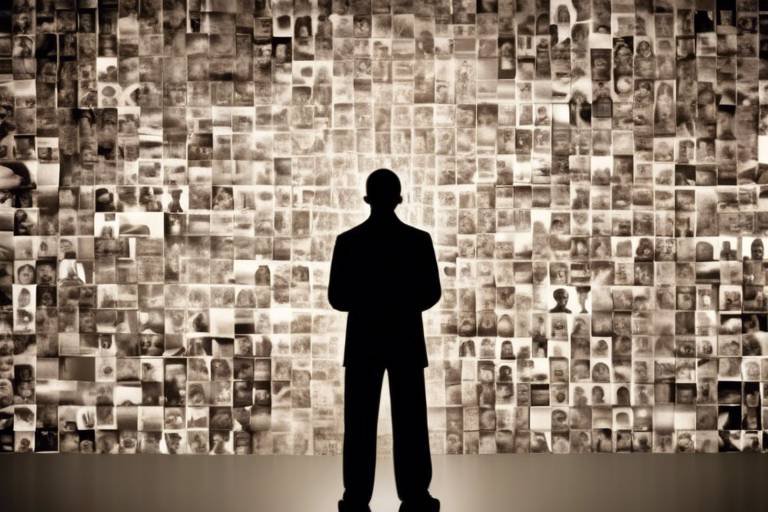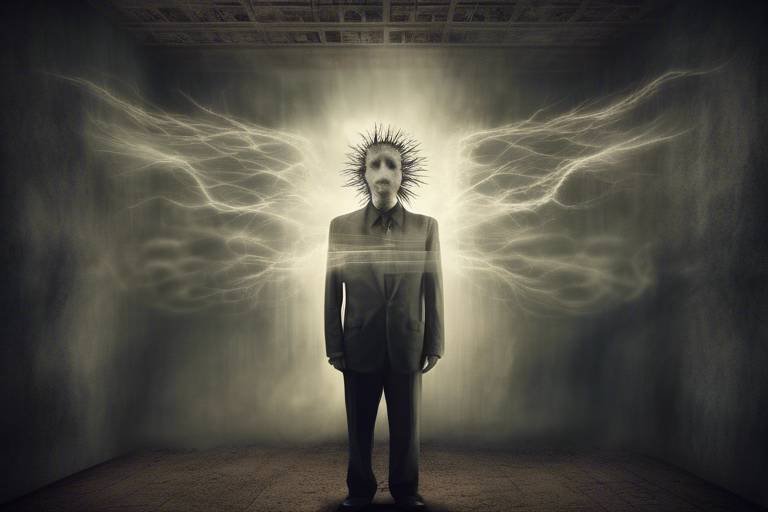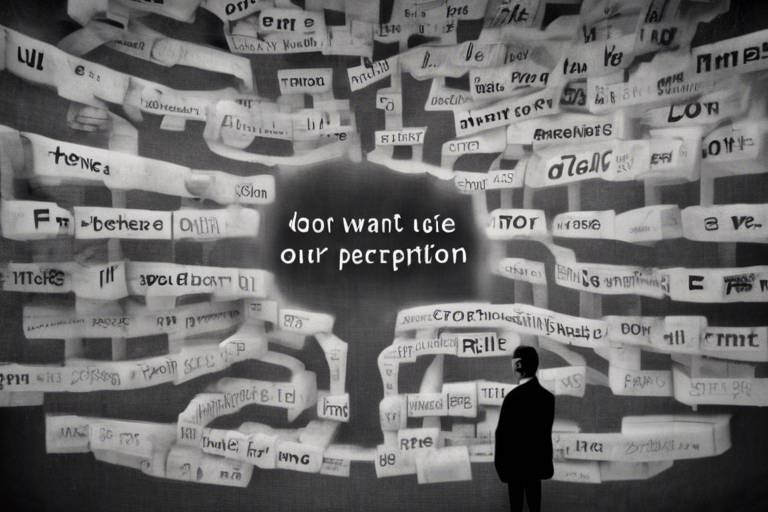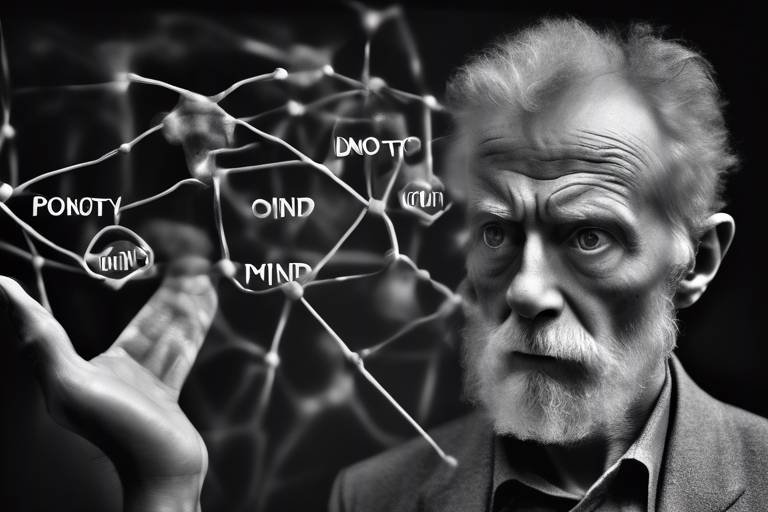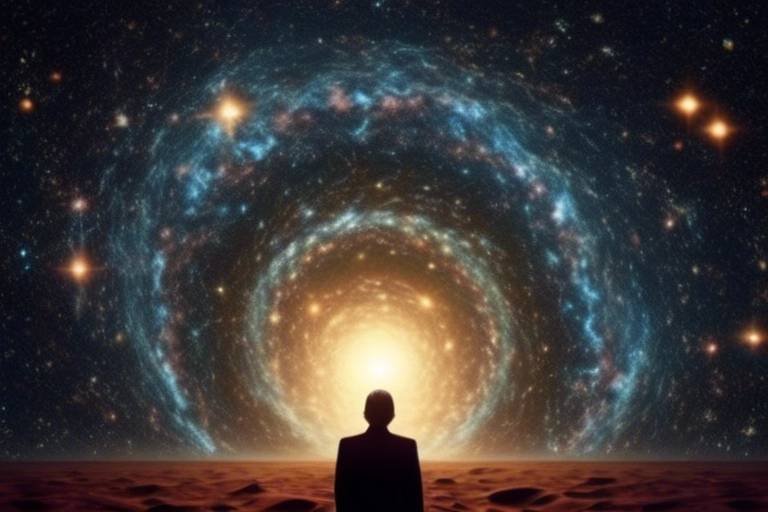The Metaphysics of Free Will – Is Freedom An Illusion?
The question of free will has captivated thinkers for centuries, diving deep into the essence of what it means to be human. Are we truly the architects of our own destinies, or are our choices merely the byproducts of an intricate web of influences beyond our control? This philosophical inquiry is not only about the nature of freedom but also touches on the core of our moral responsibility. Imagine standing at a crossroads—each path represents a choice, yet what if every step you take is predetermined by factors you cannot see? This is the crux of the debate surrounding free will.
To grasp the full picture, we must first understand what free will entails. At its core, free will is the ability to make choices that are not solely determined by external circumstances or internal compulsion. It implies a sense of autonomy, where individuals can act according to their desires and intentions. However, this concept is often challenged by various philosophical traditions, each offering unique perspectives on the interplay between determinism and freedom.
Throughout history, thinkers have grappled with these ideas. For instance, determinism asserts that every event, including human actions, is causally determined by preceding events. In contrast, libertarianism champions the notion that individuals can genuinely choose their paths, free from constraints. Meanwhile, compatibilism attempts to bridge these two views, suggesting that free will can coexist with a deterministic universe, as long as individuals act in accordance with their own desires.
As we delve deeper into the metaphysics of free will, we uncover layers of complexity. The role of consciousness cannot be overlooked; it serves as the stage where our intentions and decisions play out. What happens when we consider the findings of neuroscience? Recent studies reveal that brain activity often occurs before we consciously make a decision, which raises profound questions about the authenticity of our choices. Are we merely puppets dancing to the tune of our neural wiring?
The implications of this ongoing debate are vast. Our beliefs about free will shape our understanding of ethics and morality. If our actions are predetermined, can we hold individuals accountable for their choices? Conversely, if we embrace the idea of free will, we must grapple with the weight of moral responsibility. This philosophical tug-of-war invites us to reflect on our values and the societal structures that govern our lives.
In conclusion, the exploration of free will is far from over. As we continue to examine human agency and the philosophical implications of our beliefs, we find ourselves at a fascinating crossroads. The dialogue surrounding free will not only enriches our understanding of autonomy but also challenges us to reconsider the very fabric of our existence. Are we the masters of our fate, or are we merely players in a grand cosmic game? Only time and further inquiry will reveal the answers.
- What is free will? Free will is the ability to make choices that are not determined by external circumstances or internal compulsion.
- What is determinism? Determinism is the philosophical view that all events, including human actions, are determined by preceding events and natural laws.
- What is libertarianism in the context of free will? Libertarianism asserts that individuals have genuine free will, allowing for moral responsibility and ethical choices.
- What is compatibilism? Compatibilism argues that free will can exist even in a determined universe, as long as individuals act according to their desires and intentions.
- How does neuroscience affect our understanding of free will? Neuroscience suggests that brain activity can precede conscious decision-making, challenging the notion of authentic choice.

The Concept of Free Will
When we dive into the concept of free will, we’re not just wading into a philosophical debate; we’re exploring the very essence of what it means to be human. Free will is often defined as the ability to make choices that are not determined by prior causes or external influences. But, is it really that simple? The implications of free will stretch far beyond mere choice, touching on our notions of morality, responsibility, and the very fabric of our existence.
Different philosophical traditions have approached free will in various ways. For instance, determinism argues that every event or action, including human decisions, is the result of preceding events in accordance with the natural laws. In contrast, libertarianism holds that individuals can indeed make choices that are free from such constraints, suggesting that we have the power to alter the course of our lives. This leads us to compatibilism, a middle ground that attempts to reconcile these opposing views by suggesting that free will can exist even within a deterministic framework.
To better understand these perspectives, consider the following table that outlines the key differences:
| Philosophical View | Definition | Key Beliefs |
|---|---|---|
| Determinism | All events, including human actions, are determined by prior states. | No genuine free will; actions are predictable. |
| Libertarianism | Individuals have the capacity to choose freely. | Genuine free will exists; moral responsibility is upheld. |
| Compatibilism | Free will and determinism can coexist. | As long as actions align with desires, free will is present. |
As we dissect these views, it’s essential to ask ourselves: What does it mean to be free? Is freedom simply the absence of constraints, or is it something deeper, tied to our consciousness and self-awareness? The exploration of free will isn’t just an academic exercise; it’s a journey into understanding who we are as individuals and what drives our decisions.
Moreover, the implications of free will extend into our everyday lives. When we believe we have free will, we tend to feel more empowered in our choices, leading to a greater sense of responsibility for our actions. Conversely, if we view ourselves as mere products of our environment and biology, it can lead to feelings of helplessness and resignation. This interplay between belief and behavior is a fascinating area of study in both philosophy and psychology.
In conclusion, the concept of free will is a rich tapestry woven from various threads of thought, each contributing to our understanding of autonomy and moral responsibility. As we continue to explore this profound topic, we must remain open to the complexities and nuances that define our existence. After all, the question of whether we are truly free may be one of the most significant inquiries of our time.

Historical Perspectives
Throughout the ages, the concept of free will has been a hotbed of philosophical inquiry, sparking debates that resonate even today. Think about it: the very essence of our choices and actions hinges on whether we are truly free or merely puppets of fate. Historical figures like René Descartes, Immanuel Kant, and David Hume have shaped this discourse, each contributing unique perspectives that have influenced contemporary thought on autonomy and moral responsibility.
Descartes, often heralded as the father of modern philosophy, introduced the idea of dualism, suggesting a clear distinction between the mind and the body. He argued that our capacity for rational thought and decision-making is a testament to our freedom. For Descartes, the ability to doubt, to think, and to choose is what makes us fundamentally human. He believed that free will is a divine gift, allowing individuals to transcend the deterministic nature of the physical world.
In contrast, Kant approached free will from a moral standpoint. He posited that true freedom is not merely the absence of constraints but is deeply tied to our moral obligations. According to Kant, we are free when we act according to rational principles rather than being driven by mere impulses or external influences. This idea of autonomy is central to his moral philosophy, emphasizing that our ability to legislate moral laws for ourselves is what grants us true freedom.
Then there's David Hume, who brought a more skeptical lens to the discussion. Hume argued that human actions are ultimately determined by our desires and emotions, which are themselves shaped by prior experiences and circumstances. He introduced the notion of compatibilism, suggesting that free will and determinism are not mutually exclusive. For Hume, understanding our motivations and the causes behind our actions is crucial to grasping the nature of freedom.
The historical perspectives on free will can be summarized in the following table:
| Philosopher | Key Ideas |
|---|---|
| René Descartes | Dualism; free will as a divine gift. |
| Immanuel Kant | Autonomy tied to moral obligations; freedom is acting according to rational principles. |
| David Hume | Compatibilism; actions determined by desires and experiences. |
As we traverse through these diverse viewpoints, it becomes evident that the debate over free will is not just a philosophical exercise but a vital inquiry into what it means to be human. Each philosopher has left an indelible mark on our understanding of freedom, urging us to ponder: Are we truly the architects of our destinies, or are we merely navigating a preordained path?
As we reflect on these historical perspectives, it’s crucial to recognize that the discourse surrounding free will continues to evolve. New ideas and interpretations emerge, challenging our understanding and inviting us to explore deeper into the essence of human agency. So, what do you think? Is freedom an illusion, or do we hold the reins of our choices?
- What is free will? Free will is the ability to make choices that are not determined by prior causes or external factors.
- What is determinism? Determinism is the philosophical belief that all events, including human actions, are determined by preceding events and natural laws.
- What is compatibilism? Compatibilism is the view that free will and determinism can coexist, suggesting that individuals can be free even in a determined universe.
- Who are some key philosophers in the debate over free will? Notable philosophers include René Descartes, Immanuel Kant, and David Hume, each offering distinct perspectives on the nature of freedom and moral responsibility.

Determinism vs. Free Will
The debate between determinism and free will has long captivated philosophers, scientists, and everyday individuals alike. At the heart of this discussion lies a fundamental question: Are our actions the result of prior causes, or do we possess the ability to choose freely? Determinism suggests that every event, including human decisions, is the outcome of preceding events governed by the laws of nature. In this view, our choices are merely the end product of a long chain of causality, leaving little room for genuine autonomy.
On the other hand, proponents of free will argue that individuals have the capacity to make choices independent of external influences. They believe that we are not just passive players in a predetermined game but active participants who can shape our destinies. This perspective raises an intriguing paradox: if our decisions are truly free, how do we account for the myriad of factors that influence our thought processes, such as upbringing, culture, and even biology?
To better understand this conflict, consider the following table that outlines the core differences between determinism and free will:
| Aspect | Determinism | Free Will |
|---|---|---|
| Definition | All events are determined by preceding causes. | Individuals can make choices independent of external factors. |
| Nature of Choice | Choices are illusions; all actions are predetermined. | Choices are real and reflect personal agency. |
| Moral Responsibility | Limited; accountability is questioned. | Strong; individuals are responsible for their actions. |
| Philosophical Implications | Challenges concepts of justice and ethics. | Supports moral frameworks based on autonomy. |
This tension between determinism and free will is not merely academic; it has profound implications for how we view ourselves and our place in the world. For instance, if we accept that our choices are predetermined, it may lead to a sense of helplessness, as if we are mere puppets dancing to the strings of fate. Conversely, embracing the idea of free will can empower individuals, fostering a belief that they can effect change in their lives and the world around them.
Moreover, the interplay between these two concepts is evident in various aspects of life, from legal systems to personal relationships. For example, in a legal context, if a defendant argues that their actions were predetermined by their upbringing or mental state, it raises questions about culpability and justice. How do we assign blame or praise when the lines between choice and influence are so blurred?
Ultimately, the debate between determinism and free will is a rich tapestry woven with threads of philosophy, psychology, and neuroscience. Each perspective offers valuable insights, yet neither can fully encapsulate the complexity of human experience. As we continue to explore this fascinating discourse, we may find that the truth lies not entirely in one camp or the other, but in a nuanced understanding of how our choices are influenced by both internal desires and external circumstances.

Hard Determinism
Hard determinism is a philosophical stance that asserts every event, including human actions, is the result of preceding events governed by natural laws. This perspective challenges our intuitive sense of free will, suggesting that our choices are merely the end result of complex causal chains that we cannot control. Imagine a grand game of dominoes, where each piece falls in a predetermined sequence dictated by the initial push; similarly, hard determinism posits that our lives are a series of events triggered by prior states, leaving little room for genuine autonomy.
One of the core implications of hard determinism is the denial of moral responsibility. If every action we take is simply the outcome of prior conditions, can we truly be held accountable for our choices? This raises significant questions about justice, punishment, and ethical behavior. For instance, if someone commits a crime, should they be punished for their actions, or should we view them as a product of their environment and biological makeup? This viewpoint can lead to a more compassionate understanding of human behavior, yet it can also create a slippery slope where accountability is diminished.
To further illustrate hard determinism, consider the following key points:
- All events are causally determined: Every choice and action is influenced by a chain of prior events, from genetic predispositions to environmental factors.
- Illusion of choice: The feeling of making a free choice is merely a byproduct of complex neurological processes and external influences.
- Moral implications: If free will is an illusion, traditional concepts of justice and punishment may need to be reevaluated.
Critics of hard determinism argue that it undermines human dignity and the essence of what it means to be human. They contend that the ability to make choices, even if influenced by past events, is central to our identity. This debate often leads to the question: if we are not the authors of our actions, then who are we? The implications of hard determinism stretch beyond philosophy into psychology, law, and even religion, sparking discussions about fate, destiny, and the nature of existence itself.
In summary, hard determinism presents a compelling argument that challenges our perceptions of free will and moral responsibility. By positing that all actions are determined by prior causes, it invites us to reconsider the foundations of ethics and the nature of human agency. As we delve deeper into this philosophical inquiry, it becomes clear that understanding the implications of hard determinism is crucial for navigating the complexities of human behavior and societal norms.
- What is hard determinism? Hard determinism is the belief that all events, including human actions, are determined by preceding events, negating the possibility of free will.
- How does hard determinism affect moral responsibility? If our actions are predetermined, it raises questions about whether we can be held morally accountable for them.
- What are the implications of hard determinism in society? Hard determinism can influence how we view justice, punishment, and rehabilitation, potentially leading to more compassionate approaches to criminal behavior.

Libertarian Free Will
Libertarian free will is a fascinating and often contentious concept that asserts individuals possess the ability to make choices that are not predetermined by prior events or external influences. This perspective stands in stark contrast to determinism, which suggests that every action and decision is the result of preceding causes. Imagine standing at a crossroads, where every path represents a different choice. Libertarianism argues that you have the power to choose any path, free from the constraints of prior experiences or external pressures.
At the heart of libertarian free will lies the belief in moral responsibility. If our actions are genuinely free, then we can be held accountable for them. This idea resonates deeply in our legal systems and ethical frameworks. For instance, if someone commits a crime, the libertarian view holds that they made a conscious choice to do so, thus justifying punishment. On the flip side, if our actions are merely the result of deterministic forces, can we truly blame individuals for their actions? This question complicates our understanding of justice and accountability.
Libertarians often emphasize the role of intention and desire in decision-making. They argue that even if certain factors influence our choices, the ultimate decision rests with the individual. This perspective suggests that while we may be shaped by our environment, upbringing, and experiences, we still possess an inner autonomy that allows us to override these influences. Consider a person trying to quit smoking; they might feel the urge to smoke due to stress, yet they can choose to resist that urge and opt for healthier coping mechanisms. This ability to choose differently is a cornerstone of libertarian free will.
Critics of libertarianism often point to the complexities of human psychology and neuroscience. Some argue that our choices are heavily influenced by subconscious processes, suggesting that our perception of free will is an illusion. However, libertarians counter that even if subconscious factors play a role, the conscious mind still has the ultimate authority to make decisions. This ongoing debate raises intriguing questions about the nature of consciousness and the extent of human agency.
In summary, libertarian free will posits that individuals have the capacity to make genuine choices, free from the constraints of determinism. It emphasizes moral responsibility and the importance of intention in decision-making. While it faces challenges from various philosophical and scientific perspectives, it continues to be a compelling argument in the quest to understand human freedom. The allure of the idea that we can shape our destinies, despite external influences, is a powerful notion that resonates with many seeking to understand their place in the world.
- What is libertarian free will?
Libertarian free will is the belief that individuals have the ability to make choices that are not determined by prior events or external influences.
- How does libertarianism differ from determinism?
Determinism posits that all events, including human actions, are determined by preceding events and natural laws, while libertarianism argues for genuine choice and moral responsibility.
- What are the implications of believing in libertarian free will?
Believing in libertarian free will affects our views on ethics, morality, and social responsibility, as it implies that individuals can be held accountable for their actions.
- Can subconscious factors influence our choices?
Yes, critics argue that subconscious processes can play a significant role in decision-making, but libertarians maintain that conscious choice ultimately prevails.

Compatibilism
Compatibilism is a fascinating philosophical stance that attempts to bridge the gap between the seemingly opposing views of free will and determinism. At its core, compatibilism argues that free will is not incompatible with a determined universe. This perspective posits that even if our actions are influenced by prior events and natural laws, we can still be considered free as long as we act according to our desires and intentions. Imagine a river flowing within its banks; while the water is guided by the contours of the land, it still moves freely within those boundaries. This analogy encapsulates the compatibilist view: our choices may be shaped by external factors, yet we retain a sense of agency as we navigate through them.
One of the key features of compatibilism is its focus on the definitions of freedom and responsibility. Compatibilists argue that freedom should be understood not as the absence of constraints but rather as the ability to act in accordance with one’s motivations and rational deliberations. In this framework, a person is considered free if they can act according to their desires without external coercion. For instance, if someone chooses to pursue a career in art rather than medicine because they are passionate about creativity, they are exercising their free will, even if their interest in art was influenced by their upbringing and experiences.
Critics of compatibilism often question whether this definition of freedom truly captures the essence of what it means to be free. They argue that if our desires and intentions are themselves shaped by prior causes, then can we genuinely claim to be making free choices? This line of questioning leads to profound implications for moral responsibility. If our actions are ultimately determined by factors beyond our control, can we hold individuals accountable for their choices? Compatibilists respond by emphasizing that moral responsibility is still relevant, as individuals can reflect on their motivations and make conscious decisions, even within a deterministic framework.
To better understand compatibilism, it’s helpful to explore its main principles:
- Freedom as Rational Agency: Compatibilists assert that true freedom lies in our ability to act rationally and in accordance with our desires.
- Responsibility and Accountability: Even if our choices are influenced by prior causes, we can still be held morally responsible for our actions.
- Acceptance of Determinism: Compatibilists accept that the universe operates under deterministic laws, yet they maintain that this does not negate our freedom.
In conclusion, compatibilism offers a nuanced perspective that invites us to reconsider our understanding of free will. By recognizing that our choices can be both influenced by prior events and still reflect our true desires, we can appreciate the complexity of human agency. This philosophical viewpoint encourages a more compassionate understanding of moral responsibility, suggesting that even in a determined world, our capacity for choice remains a vital aspect of our humanity.
- What is compatibilism? Compatibilism is the philosophical view that free will and determinism are compatible, suggesting that individuals can act freely even if their actions are influenced by prior causes.
- How does compatibilism define free will? Compatibilism defines free will as the ability to act according to one's desires and intentions without external coercion, rather than the absence of constraints.
- Can individuals be held morally responsible under compatibilism? Yes, compatibilists argue that individuals can still be held morally responsible for their actions, as they can reflect on their motivations and make conscious decisions.

The Role of Consciousness
The concept of consciousness plays a pivotal role in the ongoing debate about free will. It’s like the stage on which the drama of decision-making unfolds, providing the backdrop for our thoughts, intentions, and actions. But what exactly is consciousness? In simple terms, it’s our awareness of ourselves and our environment, a complex interplay of thoughts, feelings, and perceptions that shape our understanding of reality. When we think about free will, we often assume that our conscious mind is the ultimate decision-maker. However, this assumption can be misleading.
Imagine you’re at a crossroads, faced with a choice that seems entirely yours to make. You might feel a sense of freedom as you weigh your options, but what if I told you that much of this decision-making process occurs beneath the surface of your conscious awareness? Recent studies in neuroscience have suggested that our brains often initiate actions before we are even aware of them. This raises intriguing questions: If our brain is making decisions before we consciously recognize them, are we truly the masters of our own choices?
To further illustrate this point, consider the following findings from neuroscience research:
| Study | Findings |
|---|---|
| Libet's Experiment | Showed that brain activity indicating a decision occurs milliseconds before the subject is consciously aware of their choice. |
| fMRI Studies | Revealed patterns of brain activity that predict a decision several seconds before the individual is aware of their intention. |
This emerging evidence challenges the traditional notion of free will, suggesting that our conscious mind may not be the sole arbiter of our decisions. Instead, it might be more accurate to view consciousness as a post-hoc rationalizer, a storyteller that explains and justifies the choices our brain has already made. This perspective can be disconcerting, as it implies that our sense of autonomy might be an illusion, crafted by our mind to make sense of actions that are, in reality, influenced by a myriad of factors beyond our control.
Moreover, the role of consciousness extends beyond mere decision-making; it also encompasses our ability to reflect on our choices and their consequences. This reflective capacity allows us to learn from our experiences, adjust our behaviors, and develop a sense of moral responsibility. However, if our decisions are largely determined by unconscious processes, how do we reconcile this with our understanding of ethics and accountability? This is where the philosophical implications of consciousness become particularly profound.
In essence, while consciousness is integral to our experience of free will, it may not function in the way we intuitively believe. It’s a complex interplay of awareness, intention, and subconscious influences that shapes our actions. As we delve deeper into the mysteries of the mind, we must grapple with the possibility that our perceived freedom is intricately tied to a web of biological, psychological, and environmental factors.
- What is consciousness? Consciousness refers to our awareness of ourselves and our surroundings, encompassing thoughts, feelings, and perceptions.
- How does neuroscience challenge the idea of free will? Neuroscience suggests that brain activity can precede conscious decision-making, raising questions about the authenticity of our choices.
- Can we still hold people accountable for their actions if free will is an illusion? This is a complex issue, as moral responsibility may still exist even if our decisions are influenced by unconscious processes.

Neuroscience and Free Will
In recent years, the intersection of neuroscience and the concept of free will has sparked intense debate among philosophers, scientists, and the general public. Imagine a scenario where your brain is like a complex orchestra, with various instruments (neurons) playing in harmony to create the symphony of your thoughts and actions. But what if I told you that the conductor, who is supposed to guide this orchestra, might not be as in control as we once believed? This is where neuroscience comes into play, challenging our traditional views on autonomy and decision-making.
Studies using advanced imaging techniques, such as functional magnetic resonance imaging (fMRI), have shown that brain activity can precede conscious awareness of a decision. For instance, experiments conducted by neuroscientist Benjamin Libet in the 1980s demonstrated that the brain exhibits readiness potential—a neurological signal indicating that a decision has been made—up to several hundred milliseconds before a person consciously acknowledges that decision. This raises profound questions: If our brains are firing away before we even realize it, are we truly the architects of our choices, or are we merely the spectators of a pre-scripted play?
Moreover, the implications of these findings extend beyond mere curiosity. They touch upon the very core of our understanding of moral responsibility. If our decisions are influenced by brain processes that occur outside our conscious awareness, can we still hold individuals accountable for their actions? This dilemma has significant ramifications for the legal system, ethical theories, and societal norms. Imagine a world where people could claim that their decisions were merely the result of neural impulses, shifting the burden of responsibility away from the individual.
Additionally, the concept of free will can be further complicated by the role of external influences. Our environment, upbringing, and experiences shape our neural pathways, influencing how we think and act. This interplay between biology and environment suggests that while we may feel like we have control over our choices, many factors are at play behind the scenes, orchestrating our actions like unseen puppeteers. To visualize this, consider the following table that outlines the key elements influencing our decision-making process:
| Influencing Factors | Description |
|---|---|
| Neural Activity | Brain processes that occur before conscious awareness of a decision. |
| Environment | External factors like culture, society, and personal experiences. |
| Genetics | Inherited traits that may predispose individuals to certain behaviors. |
| Emotional States | Feelings that can heavily influence our decision-making processes. |
As we delve deeper into the neuroscience of free will, it becomes clear that our understanding of autonomy is far more nuanced than a simple binary of "free will" versus "determinism." Instead, it resembles a complex tapestry woven from threads of biology, psychology, and sociology. The more we learn about how the brain functions, the more we must reconsider what it means to be truly free.
In conclusion, the relationship between neuroscience and free will is an ongoing area of exploration that challenges our perceptions and beliefs. As we continue to unravel the mysteries of the brain, we find ourselves at a crossroads: embracing the idea that while we may not be the ultimate masters of our fate, we still possess a unique capacity for reflection, intention, and growth. Perhaps, in this intricate dance of neurons and choices, we can find a new understanding of what it means to be human.
- What is the main argument against free will from a neuroscience perspective? Neuroscience suggests that brain activity can precede conscious decision-making, implying that our choices may not be entirely under our control.
- How do emotional states influence our decision-making? Emotions can significantly impact our choices, often leading us to act impulsively or in ways that align with our feelings rather than rational thought.
- Can we still hold individuals accountable for their actions if free will is an illusion? This is a contentious issue, with some arguing that moral responsibility remains intact, while others believe accountability should be re-evaluated in light of neuroscientific findings.

Philosophical Implications
The philosophical implications of the free will debate extend far beyond mere academic discussion; they seep into the very fabric of our daily lives and moral frameworks. When we ponder whether our choices are genuinely free or predetermined, we begin to navigate a complex web of ethics, accountability, and societal norms. Does believing in free will empower us to take responsibility for our actions, or does it lead to a sense of disillusionment? This fundamental question can shape our approach to morality and justice.
Consider the ramifications of a deterministic worldview. If we accept that all our actions are the result of prior causes, it may lead to a more compassionate understanding of human behavior. For instance, when someone commits a crime, the deterministic perspective might encourage us to look at the underlying factors—such as their environment, upbringing, and mental state—that contributed to their actions rather than solely judging them for the act itself. This could foster a more rehabilitative approach to justice, focusing on prevention rather than punishment.
On the other hand, embracing libertarian free will can lead to a more traditional view of morality, where individuals are held accountable for their choices. This perspective can bolster the idea of personal responsibility, encouraging people to strive for ethical behavior and make conscious decisions. However, it also raises the question: Are we truly in control, or are we merely responding to a complex interplay of influences?
To illustrate the nuances of these philosophical implications, we can examine the following table that contrasts the views of determinism and libertarianism:
| Aspect | Determinism | Libertarianism |
|---|---|---|
| Nature of Choice | Choices are determined by prior events | Choices are freely made and independent |
| Moral Responsibility | Limited or non-existent responsibility | Full moral accountability |
| Implications for Justice | Focus on rehabilitation and understanding | Emphasis on punishment and deterrence |
The implications also stretch into the realm of social responsibility. If we view ourselves as agents of free will, it can inspire a sense of duty to contribute positively to society. We might feel compelled to engage in altruistic actions, believing that our choices can effect change. Conversely, if we lean towards a deterministic view, it might lead to a sense of helplessness, questioning whether our efforts truly matter in the grand scheme of things.
Ultimately, the philosophical implications of free will challenge us to reflect on our beliefs and their consequences. As we navigate the complexities of human behavior and ethics, we must ask ourselves: What does it mean to be free? Are we the authors of our destinies, or are we characters in a story already written? This ongoing inquiry invites us to explore the depths of our consciousness and the essence of our humanity.
- What is free will? Free will refers to the ability of individuals to make choices that are not determined by prior causes or external influences.
- What are the main theories regarding free will? The main theories include determinism, libertarianism, and compatibilism, each offering different perspectives on the nature of choice and moral responsibility.
- How does neuroscience impact the discussion of free will? Neuroscience suggests that brain activity may precede conscious decision-making, raising questions about the authenticity of our perceived choices.
- What are the ethical implications of believing in free will? Believing in free will can lead to a sense of personal responsibility, while a deterministic view may promote understanding and compassion towards human behavior.

Conclusion: The Ongoing Debate
The discussion surrounding free will versus determinism is not just an academic exercise; it resonates deeply with our everyday lives. As we navigate the complexities of our choices, the question of whether we are truly free or simply puppets of fate looms large. Are we the masters of our destiny, or do we merely dance to the tune of our biology, upbringing, and environment? This ongoing debate is akin to a philosophical tug-of-war, pulling at the very fabric of our understanding of human agency.
Many argue that believing in free will empowers individuals, instilling a sense of responsibility and moral accountability. If we accept that our choices are genuinely ours, we can take ownership of our actions, shaping our futures with intention and purpose. On the other hand, the determinist perspective offers a sobering view, suggesting that our decisions are the result of a complex interplay of prior events and natural laws, leaving little room for true autonomy.
As we delve deeper into this topic, it's essential to consider how advancements in various fields—particularly neuroscience—are reshaping our understanding of free will. Studies revealing that brain activity can precede conscious decisions challenge the very notion that we are in control of our choices. If our brains are firing off signals before we even become aware of our decisions, what does that mean for our sense of self and agency?
Ultimately, the implications of this debate extend beyond philosophy into ethics, law, and personal relationships. How we perceive free will influences our societal structures, our justice system, and even our interpersonal interactions. If we view ourselves as free agents, we may be more inclined to hold others accountable for their actions. Conversely, a deterministic outlook might foster a more compassionate understanding of human behavior, emphasizing the role of external factors in shaping individuals.
In conclusion, the ongoing debate about free will and determinism is far from settled. It invites us to explore profound questions about what it means to be human. Are we truly autonomous beings, or are we simply navigating a preordained path? As we continue to engage with these questions, we may find that the journey itself—filled with uncertainty and wonder—is just as valuable as the answers we seek.
- What is free will? Free will is the ability to make choices that are not predetermined by external circumstances or prior events.
- What is determinism? Determinism is the philosophical belief that all events, including human actions, are determined by preceding events and natural laws.
- What is compatibilism? Compatibilism is the view that free will and determinism are not mutually exclusive, allowing for free will to exist even in a determined universe.
- How does neuroscience impact the debate on free will? Neuroscience suggests that brain activity can occur before conscious decision-making, raising questions about the authenticity of our choices.
- Why does this debate matter? The implications of free will versus determinism affect ethics, morality, and how we perceive personal responsibility and accountability.
Frequently Asked Questions
- What is free will?
Free will refers to the ability of individuals to make choices that are not predetermined by external factors or prior states. It's the concept that we can act according to our own desires and intentions, allowing for moral responsibility.
- Is free will an illusion?
Some philosophical perspectives, particularly hard determinism, argue that free will is indeed an illusion, suggesting that all actions are determined by preceding events and natural laws. This viewpoint challenges the idea that we can act independently of prior causes.
- What are the main philosophical views on free will?
The main views include determinism, which denies free will; libertarianism, which asserts genuine free will; and compatibilism, which seeks to reconcile free will with determinism, suggesting that free will can exist even in a determined universe.
- How does consciousness relate to free will?
Consciousness plays a critical role in our understanding of free will. It involves awareness, intention, and the decision-making processes that contribute to our sense of autonomy and personal agency.
- What does neuroscience say about free will?
Recent advancements in neuroscience indicate that brain activity may precede conscious decision-making. This raises profound questions about the authenticity of our choices and whether they are truly free.
- Why does the debate about free will matter?
The implications of believing in free will versus determinism extend to ethics, morality, and social responsibility. How we perceive our actions and their consequences can shape our behavior and societal norms.
- Can free will and determinism coexist?
Yes, compatibilism argues that free will and determinism can coexist. It suggests that as long as individuals act according to their desires and intentions, they can be considered to have free will, even in a determined universe.




